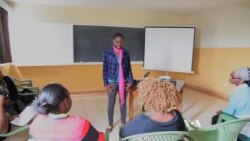Kenya risks being subjected to U.S. sanctions for failing to comply with the minimum standards of the Trafficking Victims Protection Acts (TVPA).
Twenty-seven-year-old "Ruby" — not her real name — listens attentively during an awareness seminar on human trafficking. Ruby was a victim of human trafficking, an ordeal that lasted just over a year.
Last year she registered with an agency that promised her work in Libya as a caregiver to the elderly. Being her family's sole breadwinner, she hoped to send part of her income back home to take care of her mother and siblings. When she reached Tripoli, however, her passport was confiscated and she later was subjected to both physical and sexual abuse.
Teaching skills
The session she’s attending is a seminar in which trafficking victims are taught business skills. Ruby said a lot needs to be done to bring human trafficking to an end.
“Most people are supposed to be educated about human trafficking so that they get awareness and they get to know what happens, and creating help opportunities mostly in Kenya," she said. "Because lack of jobs is what tends to give people ideas to get those outside jobs."
Ruby is one of 200 victims rescued by Awareness Against Human Trafficking (HAART) an organization formed four years ago to combat human trafficking in Kenya.
For the past three years Kenya has been on the U.S. State Department’s Tier 2 watch list for failing to seriously tackle the problem. Three years ago Kenya enacted its Counter-Trafficking in Persons Act. The law has had little impact, though, on curbing human trafficking.
Entrenched problem
The CRADLE, a children's protective foundation, reports there have been very few successful prosecutions because of the high threshold of evidence required to obtain a conviction.
Sophie Otiendo, a project consultant at HAART, is moderating the business training session. Seventeen years ago, Otiendo was herself a victim of human trafficking. She has since recovered from the trauma, and she uses her experience to encourage and empower those in similar situations. She said greed is what fuels this global scourge.
“So long as we want to get things cheap, there’s always going to be trafficking. There was slavery and now there’s trafficking because we need different things, and we have to find a way to make to get them in the cheapest possible way and that trafficking is the fuel,” said Otiendo.
The International Labor Organization says Human trafficking is the second largest source of illegal income worldwide, exceeded only by drug trafficking. And according to UNICEF, 1.2 million children are trafficked every year.





